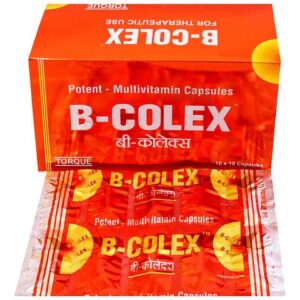VIT B 12 + L.LYSINE MONO HCI + VIT B COMPLEX
Vit B 12: Vitamin B12, also known as cyanocobalamin, is a water-soluble vitamin that is essential for the normal functioning of the nervous system, the formation of red blood cells, and the synthesis of DNA. It is primarily derived from animal sources such as meat, fish, dairy products, and eggs.
Vitamin B12 is used to treat and prevent vitamin B12 deficiency, which can result from dietary deficiencies or conditions that affect the absorption of vitamin B12, such as pernicious anemia or gastrointestinal diseases. It is also used to treat certain types of nerve damage, fatigue, and memory loss that may be associated with a deficiency of vitamin B12.
The mechanism of action of vitamin B12 involves its role as a cofactor in various enzymatic reactions. It is involved in the conversion of homocysteine to methionine, which is an essential amino acid, and in the synthesis of myelin, a substance that protects nerve fibers. Additionally, it plays a vital role in the formation of red blood cells and the maintenance of a healthy nervous system.
Vitamin B12 is available in various forms, including oral tablets, injections, and nasal sprays. The dose of vitamin B12 may vary depending on the severity of the deficiency and the individual’s age and overall health. In general, the recommended daily intake of vitamin B12 for adults is around 2.4 micrograms.
Common side effects of vitamin B12 supplementation are generally rare and usually mild. They may include nausea, mild diarrhea, headache, or itching. In rare cases, allergic reactions may occur, characterized by symptoms such as difficulty breathing, rash, or swelling of the face, lips, tongue, or throat. It is important to consult a healthcare professional before taking any vitamin B12 supplements or if you experience any concerning side effects.
L.lysine Mono Hci: Lysine Monohydrochloride, commonly known as L-lysine HCl, is a pharmaceutical-grade form of the essential amino acid L-lysine. It is commonly used as a dietary supplement to prevent or treat lysine deficiency and associated health conditions.
Lysine is an essential amino acid, which means that the body cannot produce it naturally and it must be obtained from the diet. It plays a vital role in protein synthesis and is necessary for the growth and maintenance of tissues, including muscles, bones, and skin. Lysine also helps in the production of enzymes, hormones, and antibodies.
The main therapeutic use of L-lysine HCl is to prevent and manage outbreaks of a viral infection called herpes simplex virus (HSV), including cold sores and genital herpes. It is believed that lysine works by inhibiting the replication of the virus and reducing the frequency and severity of outbreaks. However, more research is needed to fully understand the mechanism of action.
The recommended dose of L-lysine HCl for the prevention and treatment of HSV outbreaks is typically around 1,000 to 3,000 mg per day. It is usually taken orally in the form of capsules or tablets. The exact dosage may vary depending on the individual and the severity of the condition, so it is important to follow the instructions of a healthcare professional.
L-lysine HCl is generally considered safe for most people when taken in recommended doses. However, some common side effects may include gastrointestinal disturbances such as nausea, diarrhea, and abdominal pain. In rare cases, high doses of lysine may cause allergic reactions, including hives, swelling, and difficulty breathing. People with kidney or liver disease should use L-lysine HCl with caution and seek medical advice before starting treatment.
It is important to note that L-lysine HCl is a dietary supplement and not a substitute for medical treatment. If you are experiencing symptoms of herpes or any other health condition, it is recommended to consult a healthcare professional for a proper diagnosis and treatment plan.
Vit B Complex: Vitamin B Complex refers to a group of eight B vitamins that are essential for various bodily functions. These vitamins include thiamine (B1), riboflavin (B2), niacin (B3), pantothenic acid (B5), pyridoxine (B6), biotin (B7), folic acid (B9), and cyanocobalamin (B12).
Vitamin B Complex is commonly used as a dietary supplement to support overall health and well-being. It is helpful for maintaining proper metabolism, energy production, nerve function, and the formation of new red blood cells.
The mechanism of action varies for each B vitamin in the complex. For example, thiamine (B1) helps convert carbohydrates into energy, while riboflavin (B2) and niacin (B3) are involved in the production of energy from fats and proteins. Pyridoxine (B6) assists in protein metabolism, and cyanocobalamin (B12) is necessary for the synthesis of DNA and red blood cells.
The recommended dose of Vitamin B Complex may vary depending on age, gender, and specific health conditions. Generally, it is advised to follow the instructions on the supplement packaging or consult a healthcare professional for appropriate dosing.
Side effects of Vitamin B Complex are usually rare and occur when consumed in excess. However, mild side effects can include diarrhea, nausea, abdominal cramps, and an unpleasant taste in the mouth. Additionally, some individuals may experience an allergic reaction to certain B vitamins, such as biotin or cyanocobalamin. It is essential to consult a healthcare professional before starting any new supplements to ensure proper usage and to avoid any potential interactions or adverse effects.

